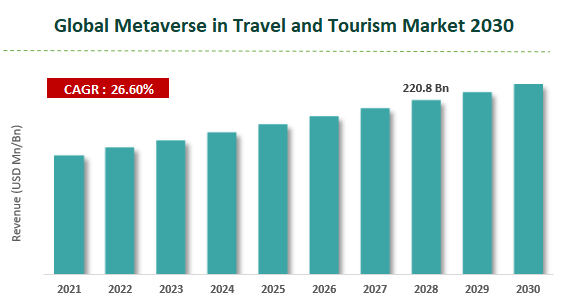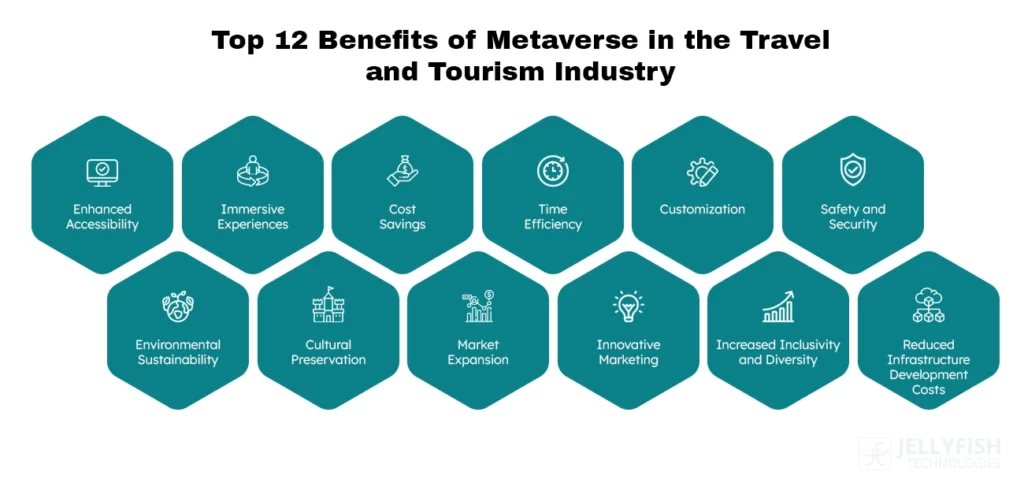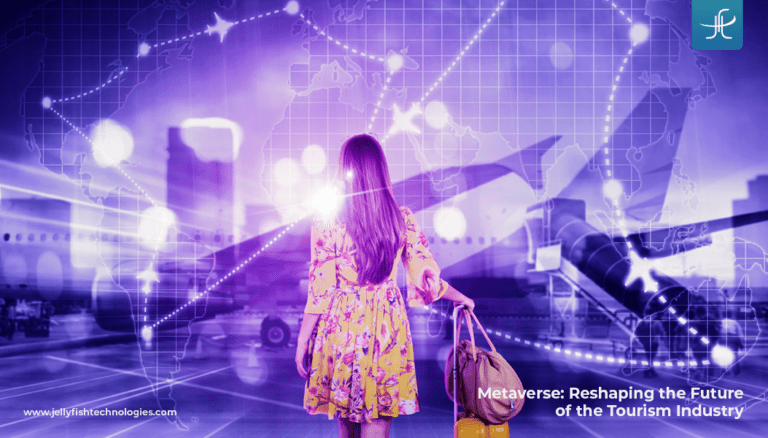Imagine taking a virtual tour of your dream destination and experiencing real-time travel from the comfort of your home. Cool isn’t it?
The concept of the metaverse has been steadily gaining momentum across various industries, and the tourism sector is no exception. As technology continues to evolve, integrating the metaverse in the tourism industry is reshaping how people experience travel and explore destinations.
Today, the metaverse in travel offers a virtual environment where users can interact with digital representations of physical spaces, providing immersive and engaging experiences that transcend the limitations of traditional travel.
With the rise of virtual reality (VR) and augmented reality (AR) technologies, the metaverse has become a powerful tool for simulating travel experiences and creating virtual destinations. From exploring iconic landmarks to embarking on virtual tours of distant destinations, the metaverse allows travelers to indulge their wanderlust without leaving the comfort of their homes. This paradigm shift in travel has the potential to revolutionize the tourism industry, offering new opportunities for destination marketing, customer engagement, and revenue generation.
In this blog post, we will delve into the benefits of the metaverse in the tourism industry while exploring its potential to transform the way we travel, experience destinations, and connect with the world around us.
Let’s begin!
Metaverse Technology in the Tourism Industry
Metaverse technology encompasses a wide range of immersive experiences, including virtual reality (VR), augmented reality (AR), and mixed reality (MR). In the tourism industry, these technologies are leveraged to create immersive virtual environments replicating real-world destinations and attractions. Through VR headsets, users can immerse themselves in lifelike simulations of famous landmarks, exotic landscapes, and cultural attractions, all from the comfort of their homes.
Virtual travel experiences powered by metaverse technology offer several advantages over traditional tourism. For one, they eliminate the constraints of time, distance, and physical limitations, allowing users to explore destinations that may be difficult or inaccessible in real life. Additionally, virtual travel experiences can be customized to suit individual preferences, offering personalized tours and activities tailored to the user’s interests and preferences.
Moreover, the metaverse in tourism opens up new possibilities for destination marketing and promotion. By creating virtual replicas of tourist destinations, destinations can attract potential visitors and showcase the unique attractions and experiences they have to offer. Virtual tours, interactive experiences, and immersive storytelling can captivate audiences and inspire them to plan future trips to the destination.
As metaverse technology continues to evolve, we can expect to see further integration of VR, AR, and MR experiences in the tourism industry. From virtual travel agencies to immersive destination experiences, the metaverse in travel is poised to revolutionize the way we explore the world and connect with new cultures and experiences.
Metaverse Market in the Travel and Tourism Industry
The metaverse market in the travel and tourism industry is experiencing rapid growth, driven by advancements in technology and changing consumer preferences. According to Facts and Factors, the global metaverse in the travel and tourism market is expected to be worth USD 220.8 billion by 2028, growing at a CAGR of 26.6% over the forecast period.

Key players in the travel and tourism industry are investing heavily in metaverse technology, recognizing its potential to enhance the travel experience and attract new customers. Virtual reality travel experiences, virtual tours, and immersive destination marketing campaigns are becoming increasingly common, as destinations seek to differentiate themselves and offer unique experiences to travelers.
One of the most promising aspects of the metaverse market in the travel and tourism industry is its ability to reach new audiences and markets. Metaverse travelers, who may not have the means or ability to travel in real life, can experience destinations virtually and participate in virtual tours and activities. This opens up new revenue streams for destinations and travel companies, as they can monetize virtual experiences and attract a global audience of virtual travelers.
In addition to virtual travel experiences, the metaverse market in the travel and tourism industry encompasses a wide range of applications, including virtual meetings and conferences, virtual events and festivals, and virtual training and education programs. As technology continues to evolve, we can expect to see even more innovative uses of metaverse technology in the travel and tourism sector, transforming the way we experience and interact with the world around us.
12 Key Benefits of Metaverse in the Travel and Tourism Industry
The integration of metaverse technology in the travel and tourism industry presents a multitude of benefits, revolutionizing the way people experience and engage with destinations. Below are the key 10 benefits of metaverse in the travel and tourism industry.

Enhanced Accessibility
Metaverse in travel breaks down barriers by providing virtual experiences that are accessible to everyone, regardless of physical limitations, financial constraints, or geographical location. Virtual travel experiences allow individuals to explore destinations and attractions from the comfort of their homes, opening up travel opportunities to a wider audience.
Immersive Experiences
Virtual reality (VR) and augmented reality (AR) technologies create immersive environments that replicate real-world destinations with stunning realism. Users can engage with virtual environments, interact with objects, and experience destinations in a way that closely mirrors real-life experiences. This level of immersion enhances the overall travel experience, making it more engaging and memorable.
Cost Savings
Virtual travel experiences offer cost-effective alternatives to traditional travel, eliminating expenses such as airfare, accommodation, and dining. Metaverse travelers can explore multiple destinations without the need for expensive travel arrangements, making travel more accessible and affordable for budget-conscious individuals.
Time Efficiency
Virtual travel experiences save time by eliminating the need for lengthy travel arrangements and time-consuming commutes. Users can explore destinations and attractions with just a few clicks, avoiding the hassle of long flights, layovers, and transportation logistics. This time efficiency allows metaverse travelers to maximize their experiences and explore more destinations in less time.
Customization
Metaverse in the travel industry allows users to customize their virtual travel itineraries, and select destinations, activities, and attractions that align with their interests and preferences. This customization enhances the overall travel experience, ensuring that metaverse travelers have meaningful and enjoyable experiences tailored to their unique preferences.
Safety and Security
Virtual travel experiences offer a safe and secure alternative to traditional travel, especially in times of uncertainty or unrest. Metaverse travelers can explore destinations without exposing themselves to potential risks such as natural disasters, political instability, or health emergencies. This enhanced safety and security provide peace of mind for travelers and reduce the likelihood of travel-related incidents.
Environmental Sustainability
Virtual travel experiences have minimal environmental impact compared to traditional travel, making them a more sustainable option for eco-conscious travelers. By reducing the need for air travel, ground transportation, and accommodation, metaverse travel helps reduce carbon emissions and alleviate pressure on natural resources. This environmental sustainability aligns with the growing trend towards responsible and eco-friendly travel practices.
Cultural Preservation
Metaverse in travel plays a role in cultural preservation by creating digital replicas of historical sites, landmarks, and cultural attractions. Metaverse travel experiences allow users to explore these destinations and learn about their cultural significance, helping to preserve and promote cultural heritage. This cultural preservation contributes to the preservation of cultural diversity and promotes cross-cultural understanding and appreciation.
Market Expansion
The integration of metaverse in the travel and tourism industry expands market opportunities by attracting new audiences and demographics. Metaverse travelers, who may not have the means or ability to travel in real life, can experience destinations virtually and participate in virtual tours and activities. This expands the customer base for travel companies and destinations, opening up new revenue streams and growth opportunities.
Also read: Step-by-Step Guide to Software Development Process
Innovative Marketing
Virtual travel experiences serve as innovative marketing tools for destinations and travel companies, allowing them to showcase their offerings in immersive and engaging ways. Virtual tours, interactive experiences, and immersive storytelling captivate audiences and inspire them to plan future trips to the destination. This innovative marketing approach enhances brand visibility, attracts new customers, and strengthens customer engagement and loyalty.
Increased Inclusivity and Diversity
Virtual travel experiences promote inclusivity and diversity by providing access to destinations and attractions that may be inaccessible or overlooked in traditional tourism. Metaverse travelers can explore diverse cultures, traditions, and perspectives from around the world, fostering greater understanding and appreciation of global diversity. Additionally, virtual travel experiences can highlight marginalized communities and lesser-known destinations, promoting cultural exchange and mutual respect among travelers.
Reduced Infrastructure Development Costs
Virtual travel experiences require minimal physical infrastructure compared to traditional tourism destinations. With the metaverse, there is no need to invest in costly construction projects or infrastructure development to attract visitors. This reduction in infrastructure costs allows destinations to allocate resources more efficiently and focus on enhancing the virtual experience for travelers, ultimately leading to a more sustainable and cost-effective approach to tourism development.
Use Cases of Metaverse in Travel
The integration of the metaverse in travel and tourism opens up a world of possibilities, offering innovative solutions and immersive experiences for travelers.
Let’s explore some real-world examples and use cases of how the metaverse transforms the travel industry.
Virtual Destination Exploration
Platforms like Google Earth VR provide users with immersive 3D experiences of real-world destinations, allowing them to virtually fly over cities, explore famous landmarks, and visit natural wonders, all from the comfort of their homes.

Immersive Travel Experiences
Airlines like Emirates offer virtual reality experiences to passengers, allowing them to explore cabins, destinations, and onboard amenities in immersive VR environments.
Virtual Tours and Experiences
Platforms like Airbnb offer virtual experiences hosted by local guides, enabling metaverse travelers to participate in virtual tours of cities, cultural experiences, and workshops.
Destination Marketing and Promotion
Tourism boards and destination marketing organizations use virtual reality to promote destinations and attract visitors. For instance, the Las Vegas Convention and Visitors Authority created a virtual reality experience called “Vegas: Alter Your Reality” to showcase the city’s attractions.
Virtual Events and Festivals
Events like the Burning Man festival host virtual events on platforms like AltspaceVR, allowing participants to explore virtual art installations, attend virtual parties, and connect with other attendees in a virtual environment.
Virtual Training and Education
Hospitality companies like Marriott International use virtual reality simulations to train employees in customer service, hospitality standards, and emergency procedures.
Remote Collaboration and Meetings
Hotels like Hilton use virtual reality meetings on platforms like Spatial to host virtual meetings and conferences, enhancing communication and productivity for remote teams.
Augmented Reality Travel Apps
Apps like AR City overlay digital information onto real-world environments, allowing metaverse travelers to discover nearby attractions, restaurants, and points of interest through smartphone cameras.
To learn the importance and scope of augmented reality in the travel and tourism industry, click here.
Virtual Property Tours
Vacation rental platforms like Airbnb offer virtual property tours, allowing metaverse travelers to explore properties in immersive 3D environments before booking their stay.
Immersive Cultural Experiences
Museums like the Louvre in Paris offer virtual reality tours of their galleries and exhibitions, allowing metaverse travelers to explore the museum’s renowned art collection and cultural heritage in immersive virtual environments.
Conclusion
The integration of the metaverse in the travel and tourism industry represents a significant paradigm shift, offering unprecedented opportunities for immersive experiences, innovative marketing strategies, and sustainable travel solutions. As technology continues to evolve, the metaverse will reshape the future of travel, transforming the way we explore destinations, plan trips, and connect with the world around us.
Amidst this swiftly changing landscape, Jellyfish Technologies stands ready to support businesses in embracing the metaverse and harnessing its potential to revolutionize the travel and tourism industry. As a leading software solution provider, Jellyfish Technologies offers a range of services and expertise to help businesses capitalize on the opportunities presented by the metaverse.
With our extensive experience in software development, virtual reality, and augmented reality technologies, we can help businesses create immersive and engaging virtual travel experiences that captivate audiences and inspire them to explore destinations virtually. Whether it’s developing virtual tours, interactive experiences, or immersive storytelling platforms, our team has the expertise to bring your virtual travel vision to life.


